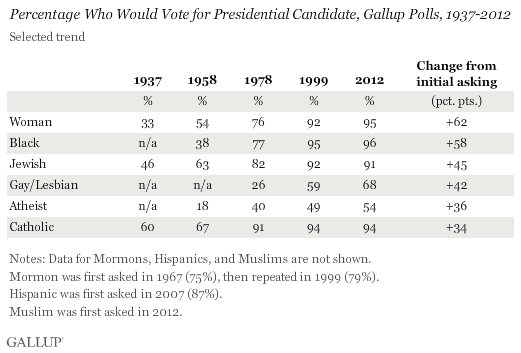You're not really addressing what I'm asking, which is: "would white Southerners in the early 90s vote for a black candidate?"
Again, yes. I’ve answered that question quite a few times.
I'm asking a very specific question about a very specific region of the US that is known for its intense issues with race, racial identity, and white supremacist reactionism within its body politic and voting trends.
Given that about 40% of America lives in the South and 5% in the entire US said they would not vote for a black man (without a black president in office), it shows that white Southerns weren’t completely shut out to the idea.
If you look at Keyes’ policies and messaging, you see that he has many positions that are similar to that of the white nationalists you are talking about. Keyes has said that blacks need to have a “moral crusade” to reach prosperity, he disavowed his lesbian daughter, he believes Obama is born in Kenya and plotted with Iran to get a third term, believes that people should take up arms to attack doctors who give abortions, and a host of other things.
Trump’s neofascists supporters don’t seem to have much of an issue of his ties to Kanye West or Ben Carson because it’s politically convenient for them. The “how can I be racist if I have black friends” argument many have used applies here.
In an election in which a third party candidate has trounced the major party's in a state, would we not also see a third party challenge in the South, or heck even Perot try and exploit those racial issues within the South that would invariably rise from Keyes nomination?
In response to that question, candidates like Bo Gritz and Howard Phillips got a stronger showing, but still had issues due to disorganized campaigns and a lack of name recognition.
IOTL’s 1992, Perot had a bad handling of race relations, referring to African-Americans as “you people.” He didn’t really put much effort into dealing with African-American issues as he was really running on opposition to NAFTA and cutting the deficit. This is the same ITTL.
https://www.nytimes.com/1992/07/12/...erot-speech-gets-cool-reception-at-naacp.html
In 1996, Perot is trying to run on the left socially, with opposition to Keyes’ foreign policy and campaigns against abortion and SSM. He sees an opening with the moderate Sam Nunn on the ticket and tries to outflank him. By this time, white Southerners have growned used to a Keyes presidency (given that he took office in January 1992) and have largely approved of his policies.
Hope that clears things up.







